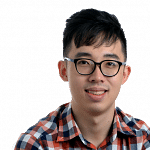The six chapters in the book span different periods in Aw's life and they narrate as well as analyse issues such as capitalism and the burgeoning class divide in modern-day Malaysia. It dips as far back as the 1920s, when Aw's maternal and paternal grandfathers first crossed the South China Sea, fleeing famine and civil war in China to land on the docks of Singapore. The title of the book is derived from the scene of their arrival.
Aw writes of it: "They did not know they were living in momentous times... the beginning of a novel whose middle chapters we are only just approaching today. Theirs was a time that would set China on a course to dominate the world's imagination a hundred years later."
Both his grandfathers eventually settled in Malaysia, one in the town of Parit in the state of Perak, the other in Kuala Krai, Kelantan, and he spent time in both places growing up.
Aw's identity as a Malaysian Chinese has inspired many of his writings, including his novel Five Star Billionaire, which was on the 2013 Man Booker Prize longlist, and his columns in The New York Times, which comment on politics, society and culture in Malaysia and Singapore.
He says: "Most of my life, I've identified as nothing more than Malaysian. But I was interested in this dual identity of being Malaysian and Chinese because in the past 10 to 15 years, especially with me living abroad, being Chinese means being associated with mainland China."
Aw, who studied law at Cambridge University and creative writing at the University of East Anglia in the United Kingdom, is based in London. But he makes several trips a year to Malaysia, where his parents live, and Singapore, where he teaches creative writing part-time at Nanyang Technological University (NTU). He was among the first writers- in-residence at NTU in 2012.
As he moves around the world, including both sides of the Causeway, he finds himself constantly negotiating the complex, ever- shifting Chinese identity today.
The bachelor, who is fluent in English, Mandarin and Cantonese and Hokkien dialects, says: "The aunties at NTU find it hard to situate me. They'd say I don't look like a Hokkien speaker. Do people have a Hokkien or Cantonese face? That sounds crazy."
Aw, who speaks with a crisp British accent but occasionally switches to a melodic Malaysian- inflected English, adds: "It's the same with my dad, he can somehow sniff out other Hainanese. All these experiences fed into my essay."
He also documents in the book his school-going experience in Malaysia, which includes enrolling in public school and meeting classmates from all walks of life.
Things, however, change with higher level education, he says. "The moment you go through secondary school, university, you see the differences that privilege gives you. In half a generation, we've created a class system... People now identify with each other based on their education."
He is also struck by how Singaporeans identify as "Singaporean, not Chinese" when they travel abroad, as well as the "determinedly different" way in which Malaysians and Singaporeans assert themselves.
He says: "I've heard Singaporeans say, 'I have Malaysian relatives, but I've no Malaysian blood in me.' So clearly, there's a keen sense to be different and distinct.
"And this argument about who 'owns' chicken rice and laksa, it's just ridiculous. Our life is too good."
Speaking of these distinctions and differences, he recalls how he was once moved by a drawing of maps in the Museum Of Islamic Art in Qatar, which illustrated how Arab trade links were first established in South-east Asia.
He says: "It moved me as it showed how a country like Malaysia was based on a culture of openness, understanding exchange with other cultures and wanting to build bridges... it's something that we seem to forget now when our rhetoric is about division, when we define our boundaries."
- The Face: Strangers On A Pier is available at major bookstores at $12.84.
- Strangers On A Pier - A Talk By Tash Aw will be held at Auditorium, City Hall Wing, Basement 1, National Gallery Singapore, 1 Saint Andrew's Road on Thursday from 7.30 to 9pm. Free admission by registration (go to peatix.com/event/153664)



